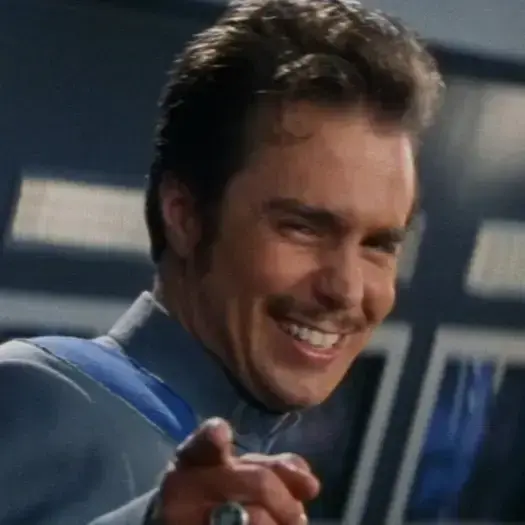With the benefit of 11 years of hindsight, lets talk about Star Trek Into Darkness. Cards on the table: I don’t like this movie at all. It’s probably my least favorite Star Trek story across the entire canon.
While this movie was being promoted, no one would confirm that Cumberbatch was Khan despite rampant speculation. He’s not even introduced as Khan, for the first half of the movie he’s “John Harrison,” and the Khan reveal is played as a big dramatic moment.
JJ Abrams’ entire shtick is that he crafts “mystery boxes.” So… is that it? Is Star Trek Into Darkness just a mystery box where the identity of the villain is the mystery, and Abrams & co. just worked backwards from there?
Lets be generous and say that’s not it: Into Darkness had something to say. We have a conspiracy, a rogue admiral, an automated super-warship, the death of a mentor… it seems like we can pull something out of here, right?
… right?
Best attempt:
The story is mainly about Kelvin Kirk learning to be less of the cocky dipshit he still is at the end of '09. He’s still riding high from his victory over the future Romulans, so he really doesn’t respect the seriousness the Chair should command. You see this in the completely unforced error at the start of the film–Spock is (for some reason) dead to rights, and Kirk decides that the power of friendship is more important than the Prime Directive. Pike rightly reams him out for this, but the character thread really comes to a head when the USS Vengeance catches up to Enterprise and prepares to utterly destroy her. Much as I complain about the movie, I do like this little moment of helplessness from Chris Pine’s Kirk. Staring down the larger ship’s guns, Kirk can only watch helplessly and apologize for leading his crew to their deaths. It has the same vibes as Kirk from Generations–he didn’t believe he was dying until he actually did. Obviously, the general thread of Kirk actually taking responsibility for his crew culminates in him doing percussive maintenance inside of the Warp Core and dying for Enterprise’s sins. He gets better, but honestly I can accept this as the transition between cadet Kirk of the 09 and the actually quite competent Captain Kirk in Beyond.
Spock is the other big character in this movie. Sad as it is, this is the only real time we get to see Kelvin Kirk and Kelvin Spock’s friendship explored in depth. They were at each other’s throats for most of '09 and Beyond focused more on McCoy + Spock’s relationship. Spock’s friendship with Kirk is the main avenue through which they explore Spock’s classic dilemma of his Human vs. Vulcan sides. As cynical as I am about them recreating the end of WoK in reverse here, I will at least concede that Pine and Quinto did well with what they were given.
Main complaint, besides Cumberbatch being Khan: they totally wasted Bruce Greenwood’s Admiral Pike here. I’m of the opinion that Kelvin Pike was the best version we’d seen prior to Discovery, and probably did more than a little bit in reviving interest in the character. Here he gets stuffed in the fridge like half an hour in to make Kirk mad/sad. What a shame.
Removed by mod
As much as I loved this movie (it was my first exposure to trek at all, which franchise has ultimately made me a better person), I hate that Abrams does what he does. His influence tends to just ruin things.
ItS a mYstERy!?
This shit was tired already in 2000s tv.
It “works” in tv because writers have to excrete an episode every week for half a year and only get to spend like a day writing. It strings audiences along through the ad breaks and keeps them hooked for next week.
It’s bad. It isn’t good writing. It isn’t saying anything about art besides “watch more”. It is easy though, and it sells shit.
Agreed Abrams ruins things, but this is the corporate art we deserve for allowing monopolies.
Corporations don’t care about making something good. They just want more return on investments than Oreos or whatever else they could have invested in.
Break up the big studios. Maybe we’ll get movies again instead of box office targets.
Yeah Abrams’ mystery box method only “works” while watching a show for the first time. But it inevitably leads to a poor conclusion, and thus a negative re-evaluation after the fact. Because the key aspect of how Abrams does it is that he doesn’t care what the resolution to the mystery is. So it hasn’t done the legwork to make the mystery feel satisfying after-the-fact. The best mysteries have reveals that in hindsight seem inevitable, which means there’s evidence that could have been used to infer it earlier, as well as red herrings which end up having adequate alternate explanations. If you decide the answer to the mystery after the fact, that’s never going to happen. Especially if you pick your answer—as he is known to have done—based on what audiences didn’t guess.
I have to admit that I was blinded by all the classic Trek references and actually enjoyed this and the 2009 movie on my first watch. It was a fun action movie with a Star Trek coat of paint on it, which got me to the theaters.
After a little while, however, the flashy new paint started peeling, and I realized that I had just liked it because it was new. It doesn’t share the same place in my heart as TOS, so whenever I feel the inclination to watch Kirk & crew explore the galaxy again, I go back to the original.
The visuals, music, and fight scenes were cool, but the writing felt superficial and boring. The same argument might be made for the original 6 movies, but I think the difference is that where the original movies felt like an encore for a beloved cast/crew that audiences were dying to see more of, the JJ movies were built without the same foundation. Watching them now feels like I’m watching a shadow of something else that was great.
“Briinnggg moneyyy”
Was it trying to say that a white guy can play a South Asian as well as a Mexican?
Was it trying to say something or was it just trying to milk the fans because they like Wrath of Kahn?
I saw this movie in cinema when it was released and I can tell you that I haven’t see it since so I haven’t got a clue ^^’
What I can tell you is that I was 13 at the time and I had probably watched most of TOS and seen a few movies with the TOS cast tho I also can’t pinpoint which. Most of the plot of Into Darkness eludes me and I know even 13 year old me thought it felt like a very generic action sci-fi film, almost like Star Wars, and that my dad was disappointed by it for similar reasons.
But I definitely wasn’t as disappointed as him; you can impress a 13 year old with explosions and I think that Leonard Nimoy’s obviously old appearance made me realize just how long ago TOS was filmed, but it also prompted me to research the actors of TOS a bit (I usually don’t care much for actors or celebrities in general).Seeing Into Darkness in cinema also lead to me believe that Star Trek as a franchise was still alive and well and I only realized later that these movies came seemingly out of nowhere. It’s probably also why my English teacher was so taken aback when I, a 7th grader, could explain a comic with a joke or pun of some kind about William Shatner’s toupee that was printed on one of her outdated worksheets a year prior to the release of Into Darkness (English isn’t my native language, otherwise this might sound pretty normal). But my parents just had their children rather late and my dad is a nerd who grew up with TOS, of course I know Star Trek.
TL;DR: I think for me personally it helped me connect to a fandom I thought was dead; I’d have to see it again to give any actual analysis of the plot.
Every time I watch this movie, I reminded of how much better it would have been with Benicio del Toro in the Khan role.
https://screenrant.com/benicio-del-toro-star-trek-2-villain-khan/
All good points for sure. I feel like the reintroduction (or new trek introduction) of section 13 was its main contribution to series going forward. Maybe some social allegory about government distrust too?





